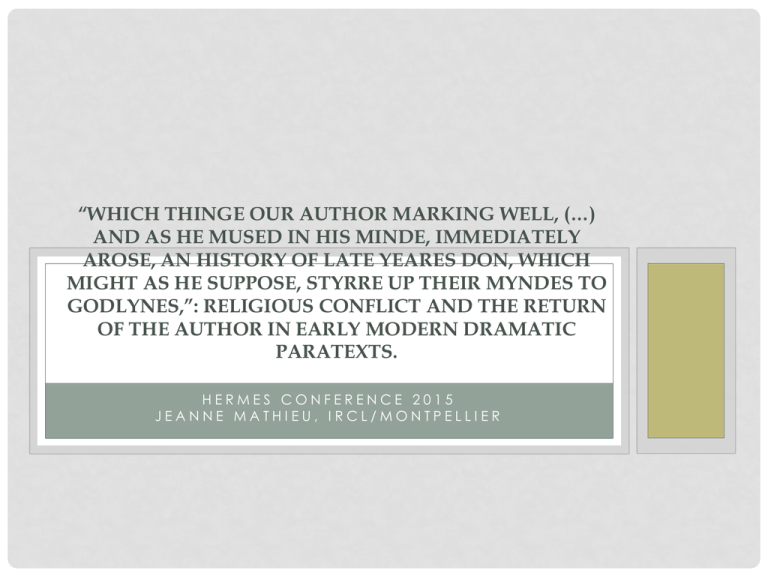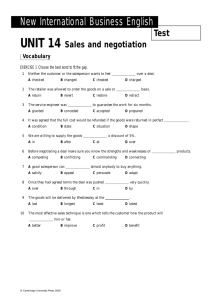Jeanne Mathieu
advertisement

“WHICH THINGE OUR AUTHOR MARKING WELL, (…) AND AS HE MUSED IN HIS MINDE, IMMEDIATELY AROSE, AN HISTORY OF LATE YEARES DON, WHICH MIGHT AS HE SUPPOSE, STYRRE UP THEIR MYNDES TO GODLYNES,”: RELIGIOUS CONFLICT AND THE RETURN OF THE AUTHOR IN EARLY MODERN DRAMATIC PARATEXTS. HERMES CONFERENCE 2015 JEANNE MATHIEU, IRCL/MONTPELLIER INTRODUCTION THE AUTHOR • Jean-Christophe Mayer: “The question of the author has never ceased to haunt the critics.” (6) • Roland Barthes: “writing is the destruction of every voice, of every point of origin, writing is that neutral, composite, oblique space where our subject slips away, the negative where all identity is lost, starting with the very identity of the body writing.” (313) • Michel Foucault: “texts, books, discourses, really began to have authors (…) to the extent that authors became subject to punishment, that is, to the extent that discourses could be transgressive.” (134) INTRODUCTION THE PARATEXT • Martha Gause McCaulley: “a non-organic element.” • Douglas Bruster: “something like 40 per cent of the surviving playtexts feature a prologue.” (1) • Richard Macksey: “those liminal devices and conventions, both within the book (peritext) and outside it (epitext), that mediate the book to the reader: titles and subtitles, pseudonyms, forewords, dedications, epigraphs, prefaces, intertitles, notes, epilogues, and afterwords (…)” (xviii) INTRODUCTION THE CORPUS Barnabe Barnes, The Devil’s Charter (1607) Thomas Dekker, The Whore of Babylon (1607) Thomas Middleton, A Game at Chess (1625) Nathaniel Woodes, The Conflict of Conscience (1581) • Christopher Marlowe, The Jew of Malta (c.15891590) • • • • I. THE THEOLOGICAL DISPUTE AND THE RISE OF THE AUTHOR • Dekker: “The generall scope of this drammaticall poem is to set forth (in tropicall and shadowed collours) the greatnes, magnanimity, constancy, clemency and other the incomparable heroical vertues of our late Queene and (on the contrary part) the inueterate malice, treasons, machinations, vnderminings, & continual blody stratagems, of that purple whore of Roome,” (Lectori 2-9) • Dekker: “I may, (by some more curious in censure, then found in iudgement), be critically taxed” (Lectori, 24-25) I. THE THEOLOGICAL DISPUTE AND THE RISE OF THE AUTHOR • Angeliki Athanasiadou: ”The choice of an adjective use in a certain position (and not only in the premodifier but also in the postmodifier and the predicative position) seems to be associated with the viewpoint of a speaker.” (210) • An Excellent New Comedie intituled: The Conflict of Consicence Contayninge a Most Lamentable Example of the Dolefull Desperation of a Miserable Worldlinge, termed, by the name of Philologvs, who forsook the trueth of Gods Gospel, for feare of the losse of lyfe, & worldly goods. I. THE THEOLOGICAL DISPUTE AND THE RISE OF THE AUTHOR I. THE THEOLOGICAL DISPUTE AND THE RISE OF THE AUTHOR • Dekker: “of such a scantling are my words set downe, that neither the one party speakes too much, not the other (in opposition) too little in their owne defence.” (Lectori.20-23). • Dekker: “(in Tropicall and shadowed collours)” (Lectori.12) • ODNB: “Middleton went into hiding, pursued by a warrant; his son, Edward, was arrested and brought before the privy council; Middleton himself claimed, in a poem to King James, that he was imprisoned ‘in the Fleet’. None of his extant plays can be convincingly dated after August 1624, and he was probably released on condition that he stopped writing for the stage.” (“Middleton, Thomas (bap. 1580, d. 1627”) II. AUTHORSHIP AND AUTHORITY • Dekker: “(…) wee present / Matter aboue the vulgar Argument: / Yet drawne so liuely, that the weakest eye, / (…) / (…) may reach the mistery: / What in it is most graue, will most delight.” (The Prologue. 3-8) • Dekker: “I falsifie the account of time, and set not down Occurrents, according to their true succession, (…) I write as a Poet, not as an Historian, and (…) these two doe not liue vnder one law.” (Lectori.21-24). • Woodes: And though the Historie of it selfe, be too too, dolorus, And would constraine a man with teares of blood, his cheekes to wett, Yet to refresh the myndes of them that be the Auditors, Our Author intermixed hath, in places fitt and meete, Some honest mirth, yet alwaies ware, DECORVM, to exceede: (The Prologue.63-67) II. AUTHORSHIP AND AUTHORITY • Middleton: “What of the Game, cald Chesse-play can be made / To make a Stage-Play, shall this day be plaid.” (The Prologue.1-2) • Marlowe: “And if ought here offend your eare or sight, / We onely Act, and Speake, what others write.” (The Epilogue.5-6). • Helen Smith and Louise Wilson: “(…) paratextual elements are in operation all the way through the reader’s experience of the text, not merely at the start, and they continuously inform the process of reading, offering multiple points of entry, interpretations, and contestations.” (6) II. AUTHORSHIP AND AUTHORITY II. AUTHORSHIP AND AUTHORITY • Gerard Genette: “Indeed, this fringe, always the conveyor of a commentary that is authorial or more or less legitimated by the author, constitutes a zone between text and off-text, a zone not only of transition but also of transaction: a privileged place of pragmatics and a strategy of an influence on the public, an influence that – whether well or poorly understood and achieved – is at the service of a better reception for the text and a more pertinent reading of it (more pertinent, of course, in the eyes of the author and his allies” (2) III. THE BIRTH OF COLLABORATIVE AUTHORSHIP • Barnes: To the honorable and his very deare friends, Sir William Herbert, and Sir William Pope Knights, associates in the noble order of the Bathe. Barnabe Barnes consecrateth his loue. Noble Gentlemen, your loue towards mee (so long time, and in so great measure continued by you, not merited by me) did tie so firme a knotte vpon the band of my dutie towards both of you, that I have lincked you both great friends in the patronage of this little Booke. And I stay well assured, that of your good affection you would in any reasonable course willingly protect him, that writte it, whose Penne and the direction thereof, with all his best faculties, hee sincerely deuoteth to your seruice, still resting yours most assured, faithfull and affectionate: Bar.Barnes. III. THE BIRTH OF COLLABORATIVE AUTHORSHIP • Gerard Genette: “The dedication always is a matter of demonstration, ostentation, exhibition: it proclaims a relationship, whether intellectual or personal, actual or symbolic, and this proclamation is always at the service of the work, as a reason for elevating the work’s standing or as a theme for commentary (…)” (2) • ODNB: “ (it) was the first single play printed with engraved title-pages.”(“Middleton, Thomas (bap. 1580, d. 1627”). • Gerard Genette: “once the possibilities of the cover were discovered, they seem to have been exploited very rapidly”. (23) III. THE BIRTH OF COLLABORATIVE AUTHORSHIP CONCLUSION • Roland Barthes: “ (…) it is language which speaks not the author.” (313) • Gerard Genette: “what enables a text to become a book.” (1) • Gerard Genette: “valid or not, the author’s point of view is part of the paratextual performance, sustains it, inspires it, anchors it.” (308) BIBLIOGRAPHY • PRIMARY SOURCES Barnes, Barnabe. The Devil’s Charter. New York: AMS Press. 1970. Dekker, Thomas. “The Whore of Babylon”. The Dramatic Works 2. Ed. Fredson Bowers. London: Cambridge University Press, 1964. Marlowe, Christopher. “The Jew of Malta “. Christopher Marlowe: The Complete Plays. Ed. J. B. Steane. London: Penguin Books, 1969. 343- 430. Middleton, Thomas. A Game at Chess. Ed. Trevor H. Howard-Hill. Cambridge: Cambridge University Press, 1993. Woodes, Nathaniel. The Conflict of Conscience. Eds. Herbert Davis and F.P. Wilson. Oxford: Malone Society, 1952. BIBLIOGRAPHY Macksey, Richard. “Foreword”. Paratexts: thresholds of interpretations. By Gerard Genette. Cambridge: Cambridge Athanasiadou, Angeliki. “Adjectives and subjectivity”. University Press, 1997. Subjectification: Various Paths to Subjectivity. Eds. Angeliki Athanasiadou, Costas Canakis and Bert Cornillie. Berlin: Sgroi, Rosemary and Alan Davidson. "POPE, Sir William (1596Mouton de Gruyter, 2006. 209-239. 1624), of Cogges, Oxon". History of Parliament Online, Web. <http://www.historyofparliamentonline.org/volume/1604Barthes, Roland. "The Death of the Author". Trans. Stephen 1629/member/pope-sir-william-1596-1624>. Heath. Modern Criticism and Theory: A reader. 3rd edition. Eds. Nigel Wood and David Lodge. Harlow: Pearson, 2014. 313-316. Smith Helen and Louise Wislon. "Introduction". Renaissance Paratexts. Eds. Helen Smith and Louise Wilson. Cambridge: Bruster, Douglas and Richard Weimann. Prologues to Cambridge University Press, 2011. 1-14. Shakespeare’s Theatre: Performance and liminality in early modern drama. London: Routledge, 2004. Stater, Victor. “Herbert, William, third earl of Pembroke (1580– 1630)”.Victor Stater Oxford Dictionary of National Biography. H. C. G. Matthew and Brian Harrison. Oxford: OUP, 2004. Foucault, Michel. “What is an author?”. Language in Theory: A Ed. Online ed. Ed. Lawrence Goldman. Jan. 2008. resource book for students. Eds. Mark Robson and Peter <http://www.oxforddnb.com/view/article/13058>. Stockwell. London: Routledge, 2005. 133-139. • SECONDARY SOURCES Gary. “Middleton, Thomas (bap. 1580, d. 1627)”. Gary Interpretation. Taylor, Taylor Oxford Dictionary of National Biography. Ed. H. C. G. Matthew and Brian Harrison. Oxford: OUP, 2004. Online ed. Ed. Lawrence Goldman. May 2008. Mayer, Jean-Christophe. Shakespeare et la postmodernité : <http://www.oxforddnb.com/view/article/18682>. essais sur l’auteur, le religieux, l’histoire et le lecteur. Bern: P. Lang, 2012. Genette, Gerard. Paratexts: Thresholds of Cambridge: Cambridge University Press, 1997. McCaulley, Martha. “Functions and Content of the Prologue, Chorus and other Non-organic Elements in English Drama, from the beginnings to 1642”. Studies in English Drama, First Series. New York: University of Pennsylvania Press, 1917.






